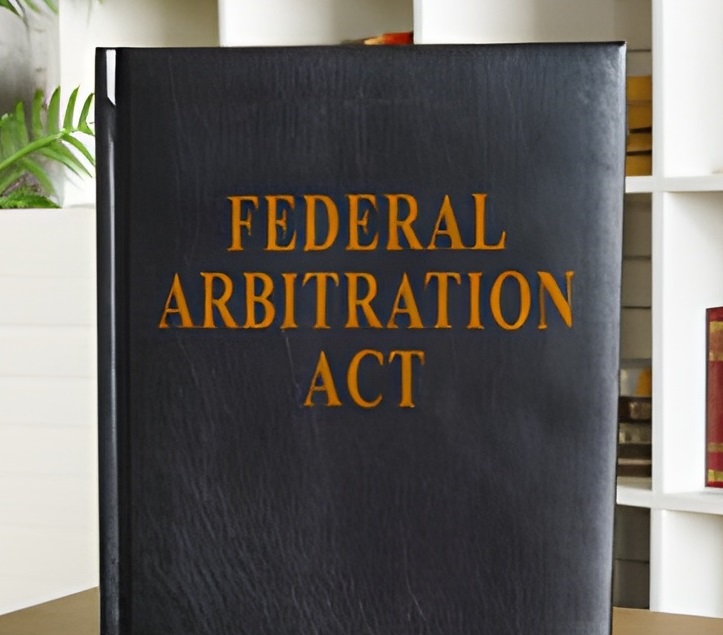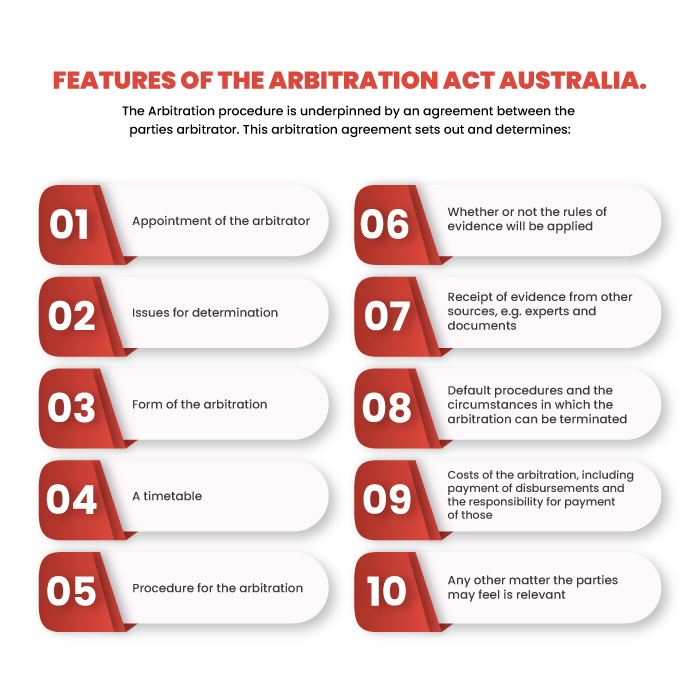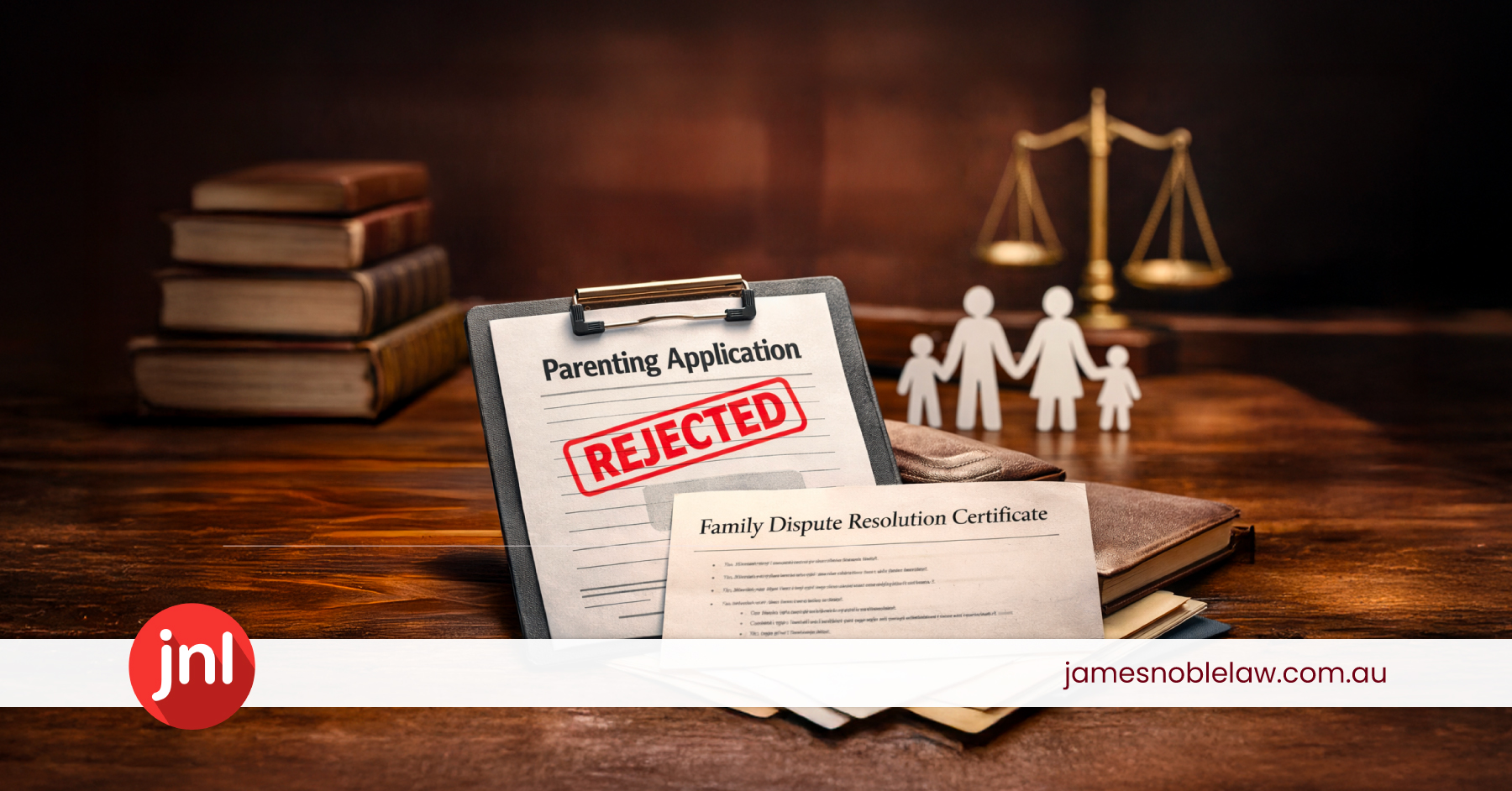Filing an Initiating Application for parenting orders can feel urgent and overwhelming especially when children are involved. However, many parents are surprised to learn that…

Arbitration Act Australia – James Noble Law

Arbitration Act Australia is a Viable Alternative to Litigation. The process that is used to submit a dispute by a party and the agreement to one or more arbitrators who make a binding decision on the dispute. In the case of arbitration law or family law arbitration, the parties choose the process of settling personal disputes without going to court.
I was in Court recently on the first Mention date of an application by the husband seeking Orders for the division of the net matrimonial assets of his relationship with my client.
Both parties requested Interim Orders to acquire specific items of furniture and personal property before reaching a final decision on the division of their assets.
Extensive negotiations took place on the morning of the Court Hearing between myself and the solicitor acting for the Applicant. Finally, the parties were able to agree on the husband retaining certain items of property and my client retaining certain items as well. The parties were able to resolve their Interim Applications.
We appeared before the Judge when Interim Orders were made by the Court. In regard to the remaining substantive issues concerning the ownership of the former matrimonial home, retention of shareholdings and options of the husband in his employer company, the division of superannuation, and the division of the remaining assets, the Application was put on the list of the pending cases for trial. The parties had already attended a formal Mediation which they had paid for but without successfully negotiating a settlement.
The Judge hearing the matter informed the parties that because of the under-appointment of Judges to the Family Court which created a limited capacity for her to hear the matter, that the call-over of trial matters would not take place prior to 12 months and that it would be another 12 months before a trial date could be allocated to the matter.
She further advised that Judges are required to list two matters for each Trial date one children’s matter and a property matter. She further advised that if the children’s matter set down on the Trial date had not been resolved then it would take preference over the property matter and the property matter would be adjourned back to a list of matters awaiting a Trial date, which could mean a further lengthy delay before a Trial date is appointed. The matter if it remains in Court may not be heard for a period of at least three (3) years.
Fortunately, my client, who was the wife in the proceedings, is able to reside comfortably in the former matrimonial home with the children.
The mortgage secured over the property had been converted to an interest-only loan at 4.24% for a period of five (5) years, which was imminently affordable for her. She maintained sound employment. She enjoyed the extensive gardens at the home.
The husband, however, was anxious to move on with his life. He had formed a new partnership and wished the matter to be resolved swiftly, which was not going to happen if the matter remained in the Court. This put great pressure on him to resolve property issues to his disadvantage.
Arbitration Act Australia – A voluntary process

A viable alternative to Litigation is Arbitration. This is extensively used in the building and construction industry. In the 1980s and 1990s, Arbitration was also used in family law matters. There were disadvantages under the legislation at that time in using Arbitration and its use diminished. The Family Law Regulations were amended in 2001 which overcame the earlier problems associated with Arbitration Act Australia.
The amendments to the regulations allowed the registration of Awards, which meant that either party could register an Award without the consent of the other party and it would still be binding on both parties. Before the amendments were made if an Award was made by the Arbitrator and one party disagreed and did not give consent to the registration of the Award then the Award could not be registered and was not binding.
After the amendments to the Regulations, the Awards now are binding even though one party may not give consent to the registration of the Award and the Awards become a binding Order of the Court.
There is now an obligation on solicitors to advise clients of the means of resolving their difficulties by way of Arbitration. There is a requirement to provide to clients a brochure titled, Marriages Family’s and Separation which deals with this and provides details of Arbitration.
The only limitation placed on Arbitration is that it cannot deal with child support issues and is unable to make binding Orders in regard to a child’s welfare. Parenting matters can be discussed, during the course of Arbitration and an agreement may be reached by the parties in regard to such matters.
The parties if they reach an agreement on parenting issues during the course of Arbitration can have that agreement set out in a Parenting Agreement or can apply to the Court for Orders to be issued by way of Consent Orders. The Award of the Arbitrator if it is to be registered with the Court and to issue as a binding Agreement, is limited to property settlement and spousal/defacto maintenance issues.
Laurence Boulle, Professor of Law, Bond University QLD, in a newsletter published in January 2014 set out the following information in regards to Arbitration:
What are the Features of the Arbitration Act Australia?
 The Arbitration procedure is underpinned by an agreement between the parties arbitrator. This arbitration agreement sets out and determines:
The Arbitration procedure is underpinned by an agreement between the parties arbitrator. This arbitration agreement sets out and determines:
- Appointment of the arbitrator;
- Issues for determination;
- Form of the arbitration;
- A timetable;
- Procedure for the arbitration;
- Whether or not the rules of evidence will be applied;
- Receipt of evidence from other sources, e.g. experts and documents;
- Default procedures and the circumstances in which the arbitration can be terminated;
- Costs of the arbitration, including payment of disbursements and the responsibility for payment of those; and
- Any other matter the parties may feel is relevant.
Forms of Arbitration
- ‘papers’ only arbitration;
- Representation of parties;
- Oral evidence or affidavit only;
- Nor limited or full cross-examination;
- No, limited or full disclosure;
- No, limited or full pleadings; and
- Opening and closing addresses.
Arbitration Procedures in Aid and Practice in Australia
There are a number of circumstances where the Court can be called upon to assist in the conduct of an Arbitration – apart from the general power to make Orders to facilitate the Arbitration.
One instance is the ability of the Arbitrator to refer a question of law arising in the Arbitration to a judge for determination. Another example arises in circumstances where, in the course of a Court-referred Arbitration under s19D, a party does not comply with a procedural direction or, in the view of the Arbitrator, does not have the capacity to participate in the Arbitration.
A third example of assistance provided by the Court relates to the ability of a party to apply to the Court for the issue of a subpoena to attend and/or produce documents at the Arbitration Act Australia. This subpoena has the same validity and effect as any other subpoena issued by the Court.
Registration, Enforcement, and Review of Awards
Once an Award has been handed down in the prescribed form, either party can apply to the Court for registration of the Award. The other party then has twenty-eight (28) days to object to its registration. Upon registration, the Award has the same effect as if it were an Order of the Court and can be enforced in the same way.
Pursuant to the provisions of the Family Law Act and the Family Court Act, the Family Court can:
- Review an award on questions of law; and/or
- Set aside an Award on the grounds that:
- The award was obtained by fraud (which included the non-disclosure of a material matter);
- The Award or agreement is void voidable or unenforceable;
- Since the making of the Award, circumstances have arisen which make it impracticable for the Award or parts of it to be carried out;
- The Arbitrator was affected by bias or there was a lack of procedural fairness in the Arbitration.
Professor Boulle states in his newsletter; “By limiting a review to a question of law only, the legislation arguable gives Arbitration Awards less potential to be overturned than a judge’s decision.“
Not all matters will be suitable for Arbitration. Solicitors acting for the parties would need to determine if the matter would be suitable for Arbitration and whether the parties would accept an award made by the Arbitrator which then becomes binding if registered with the Court.
However, the costs saving of proceeding by way of Arbitration Australia are considerable.
Peter Baston a respected Barrister, who is a qualified Arbitrator, recently published an Article and gave details of his costs for conducting an Arbitration.
These costs are published below:
How much does Arbitration typically cost?
The followings are the different types of legal fee structures for Arbitration:
Schedule of Fees 2016 (as at 1 March 2016)
| No | Service Details | Fee GST inclusive |
| 1 | Arbitration on the Papers Where the asset pool is less than $750,000 including superannuation Subject to agreement — award within 7 days of law written submission | $2,980.00 |
| 2 | Arbitration — Short Form Negotiate agreement & terms of mediation, Telephone Directions hearing, 2 hour hearing with award delivered within 7 days | $8,000.00 |
| 3 | Arbitration — 1 Day Hearing By negotiation (based on a daily fee of $4,000.00 per day including days for pre-arbitration hearing, reading & award writing) | $10,000.00 |
| 4 | Arbitration — 2 Day Hearing By negotiation (based on a daily fee of $4,000.00 per day including days for pre-arbitration hearing, reading & award writing) | $12,250.00 |
| 5 | Travel Time within 2 hours driving time of Brisbane (Such as: Coolangatta, Toowoomba & Noosa Heads) | NO fee |
| 6 | Travel Time greater than 2 hours driving time of Brisbane (Such Daily fee as: Byron Bay, Warwick & Gympie) | Daily fee $250.00 |
| 7 | Room Hire | At Cost |
The comparison in fees is significant, in litigation the matter could take up to 2 years or even longer for a matter to go before the Judge and for a decision and Judgement to be delivered by the Judge hearing the matter.
The costs to each party could exceed $50,000.00 and more likely more for the conduct of a matter to the stage of Trial; and for the Trial. This creates a great deal of emotional and financial stress for the clients.
On the other hand, Arbitrations can be dealt with speedily and within a matter of weeks or months with considerable cost saving and less emotional stress. The matter can be dealt with speedily.
In view of the amendments which have now been made Arbitration Australia is a highly effective way of reaching a quick and satisfactory resolution of family law matters.
What are the different types of legal fee structures for Arbitration?
Different types of fee structures of Arbitration are described above in the article description. Please read the above table given in the article for the legal fee structure.
What is the Quick guide – Expert Determination in Australia?
Quick guide on Arbitration Act Australia” – Expert Determination is Given here – Download PDF.
What is arbitration in law?
Arbitration in law is a process where disputing parties agree to submit their dispute to one or more arbitrators, who then make a binding decision on the matter. This process serves as an alternative to litigation, allowing parties to resolve disputes outside of court.
What does arbitration mean in law?
Arbitration means a method of dispute resolution where parties agree to have one or more arbitrators hear and decide the outcome of their dispute. The decision made by the arbitrator(s) is typically binding and enforceable, similar to a court judgment.
What is arbitration law?
Arbitration law encompasses the legal framework and regulations governing the arbitration process. It includes statutes, rules, and principles that guide how arbitration is conducted, the enforceability of arbitration agreements and awards, and the rights and obligations of the parties involved. In Australia, arbitration is regulated by the Arbitration Act and related legal provisions.
What is arbitration in family law?
Arbitration in family law is a process where parties involved in family disputes, such as divorce or property settlements, choose to resolve their issues through arbitration instead of court litigation. An arbitrator makes decisions on matters such as the division of assets, spousal maintenance, and other related issues, and the decision is binding if registered with the court.
Arbitration country where governing law is applied?
The governing law for arbitration is applied based on the country in which the arbitration agreement specifies or where the arbitration takes place. In the context of the article, the governing law for arbitration would be the laws of Australia, particularly the Arbitration Act Australia and related family law regulations.
What is family law arbitration?
Family law arbitration is a voluntary process where parties to a family dispute agree to resolve their issues through arbitration rather than through the court system. This can include matters such as property division, spousal maintenance, and other financial disputes arising from a separation or divorce. The arbitration process in family law is designed to be quicker and less costly than traditional court proceedings, and the arbitrator’s award can be registered with the court to become binding and enforceable.
In need of legal assistance?
Look no further! Discover top-notch Family Lawyers at James Noble Law, serving Brisbane Family Lawyers, Cairns Family Lawyers, and Milton Family Lawyers. Our skilled and qualified legal team is ready to offer you a complimentary 20-minute consultation – no obligations attached! Schedule your appointment now with our experienced Family Lawyers.
Locate:
Easily find us on Google Maps and take the first step towards resolving your legal matters with confidence.
Helpful Family Law Documents & Guides
- A Guide to Children Negotiation and Family Law
- A Guide to Property & Family Law Act Paper
- A Guide to Alternative Dispute Resolutions
- A Guide to Preparing for the unthinkable
- A Guide to Collaborative Practice Paper
- A Guide to Separation in Family Law
- A Guide to Family Law Property
- A Guide to Dispute Resolution
- A-Z Collaborative Law eBook
- A Guide to Separation
- A Guide to Children
- Arbitration eBook
Need Help?
Talk to a Noble Family Lawyer
Family Law News
Keep up to date and receive clarity on a range of news related articles on the James Noble Law blog.


Artificial intelligence (AI) tools are increasingly being used across professional services, including the legal profession. From drafting submissions to summarising case law and preparing chronologies,…

Family law disputes are often emotionally draining, complex, and deeply personal. When you enter mediation, the goal is to resolve issues such as parenting arrangements,…



